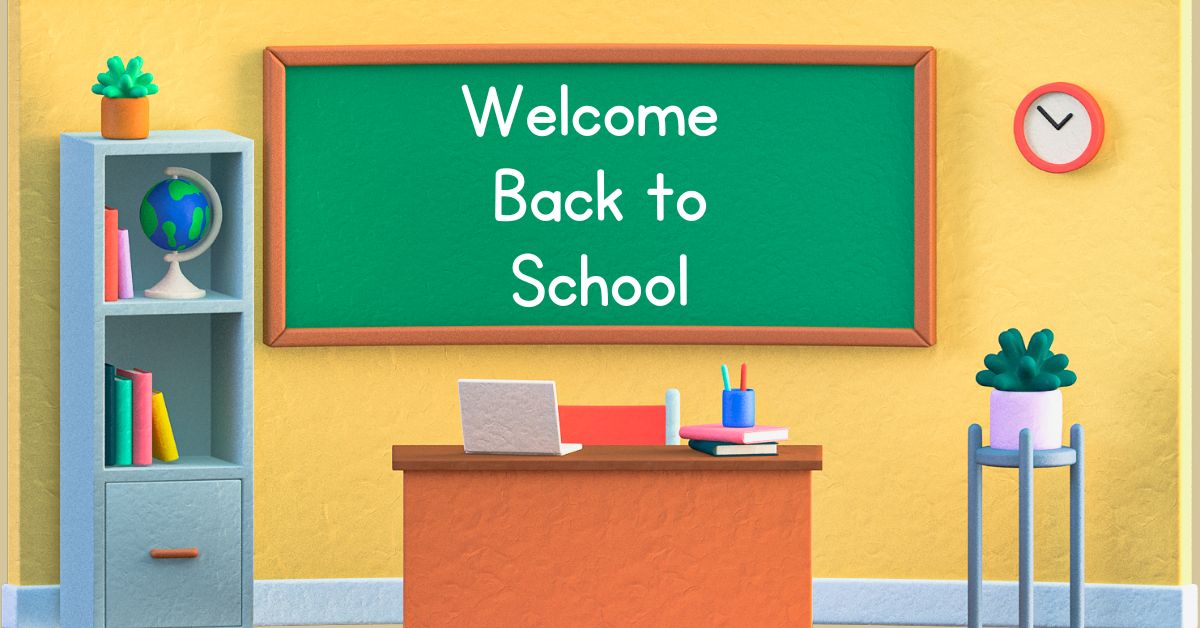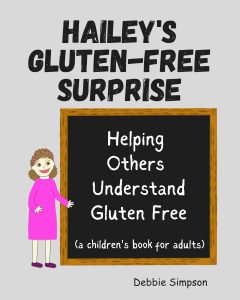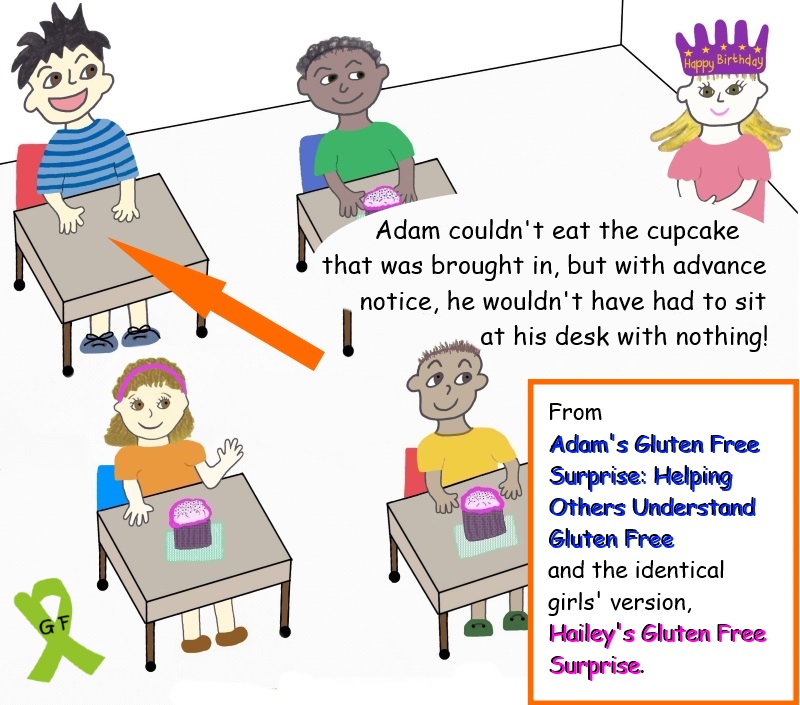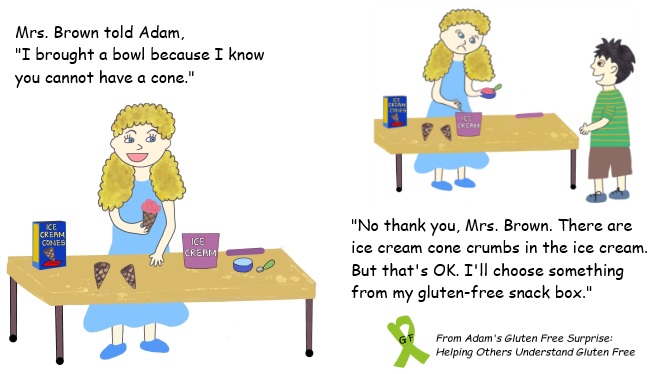This page may contain Amazon affiliate links.
The Emotional Side Part 8: Dear Teacher
My Child Needs To Be Gluten Free
This is the emotional side that so many parents of kids who need to be gluten free experience as they send their children to school. They have to wonder, Will my child be safe? Will my child be included? This post is for all the parents who want to be understood when they tell the teacher, My child HAS to be gluten free.
Dear Teacher:
The school year might start with a parent who tells you, My child has to be gluten free. You will probably be told this child has celiac (or celiac disease) or non-celiac gluten sensitivity. This parent might tell you that their child cannot ingest a single crumb of gluten. They might tell you that their child cannot play with regular play doh or participate in activities that involve certain foods. You might hear the phrase, cross contamination, being used. And you might even think, This parent is being excessive.
Please know, this parent is not exaggerating their child’s needs. You might actually have (or had) a student with celiac whose parent allowed occasional gluten, making your current parent appear even more dramatic. Please know that anyone with celiac who consumes any (even occasional) gluten is not treating this disease appropriately or safely.
It's All About the Kids
The purpose for this post isn’t to educate you about celiac or gluten. There are many articles out there for that. This post is to share the parents’ voice and to increase an understanding that benefits our kids who require special diets.
If you have a student who requires gluten free, please take a few minutes to read through this article. I reached out to several parent groups (of children who need to be gluten free) and asked: What are your hopes, concerns, fears, and experiences.
Their comments are spread throughout this post. Thank you to all the parents who contributed. Thank you to all the teachers who read this.
*Yes, this article is long, but the message is so very important. Thank you.
Awareness and Understanding vs Expectations
Being a teacher today has more responsibilities than most people realize. As a teacher, you most likely have 20 or more students. You might even have 30 students! Some of your students probably have IEP’s and some most likely have food allergies or other health needs. You not only have a curriculum to teach, lessons to plan, assessments to conduct, and data to track, but you need to be aware of certain health and dietary needs for some students.
Teachers: You have a LOT on your plate. And YOU are appreciated.
I hope that (rather than overwhelming you more), that this article helps to clarify things when it comes to students with celiac. Because it is a big deal. Your desire as a teacher is to teach. You didn’t choose or train to be a nurse or a dietitian. And you shouldn’t be expected to be either of those. But the fact remains that students with special diets in the classroom need to be understood in order to be safe and included.
Parents:
Please give your child’s teacher a container of gluten-free safe food to have on hand for those times when those snacks may be needed. Knowing an item was sent from home and approved by parents keeps your child safe and allows the teacher the security of knowing it is safe.
Teachers’ days are busy. They are beyond busy. While you have to be able to count on unapproved and unsafe food NOT being given to your child, you cannot expect teachers to be label readers (and to understand all that goes into label reading).
Communication is a two-way street, and preparation needs to start at home.
And something else that starts at home is educating your child of his/her requirements–and the importance of being able to say, No thank you, when food is offered. Easy? Nope. No way. Heck no. But it needs to be part of the process.
This is a TEAM effort: Home–School–Child
Just A BIT About Celiac
*Before I continue….
Even though I said I wouldn’t educate you about celiac, I do need to share just a few facts.
Celiac is an auto-immune disease. It is actually one of the most common but most under and mis-diagnosed auto-immune diseases. For a person with celiac, the ingestion of gluten causes a variety of reactions. And these reactions are generally not immediate.
A child with celiac in your classroom who accidentally ingests gluten, and appears fine, may have you thinking, ‘Yup, that parent really was exaggerating.’
Gluten Will Cause An Impact
Whether You See It In The Classroom Or Not
Please know this. Gluten will affect that child. It may mean s/he will have restless sleep for a night or a week, constipation for days, diarrhea, bone or muscle pain, stomachaches or headaches, vomiting, or one of hundreds of reactions. You can have five children in your classroom with gluten intolerance, and they can all react differently. And for many, this reaction can also include behavior issues, cognitive issues, or fatigue.
Yup, that single cracker (or just a very small part of it) can do all that. And I’m not even getting into the long-term consequences.
As far as the non-food items, gluten is not absorbed through the skin. What’s on the hands, however, often gets in the mouth.
So let’s move on to the purpose for this post. It’s time to share what so many parents would like you to know when they tell you, My child has to be gluten free.
Safety is Number ONE
While food safety is of utmost importance, the biggest concern for parents can often be the fear of their child being left out.
One of the most magical things about a teacher is her/his ability to meet the needs of every child in the classroom. It takes someone special to be a teacher, finding how to include and reach into every single student. The child with a gluten sensitivity is far from the only one in the classroom with a special need. But just because a child has to avoid certain foods, they should never (ever) be left out altogether.
A Little Advance Notification, Please
Several moms agree to this statement: “Please let us know in advance when there is going to be food in the classroom. We are happy to provide a gluten-free alternative for our kids.”
And:
“I wish the teacher knew that every time she forgets to tell me about a birthday or a class party, my daughter has to watch everyone else eat their treats. She may not cry in front of you or her classmates, but she cries when she comes home.”
Note to Parents: Iced cupcakes freeze well. By keeping a couple sealed and well labeled gluten-free treats in the school freezer, your child will be prepared for those surprise cupcake days. Teachers receive unexpected birthday and classroom treats all the time, so please keep something available at school.
Empathy And Understanding
The next time you are in a room filled with the heavenly aroma of pizza for all to share – before you grab a slice for yourself, imagine being unable to eat it. Now imagine that child who cannot share a slice. Is it fair for him to have to watch (and smell) while the rest of his classmates enjoy the special treat?
“I wish they wouldn’t always order pizza and not think of my child.”
What are other options? Advance notice to parents. Definitely. Many parents will send in a safe option when they are notified of a special event. The food item can be different. It often has to be. But no one should be left with nothing.
Parents: Please provide a container of food for your child’s teacher to fall back on so there is always something to offer.
Teachers: You may want to provide that gluten-free option yourself (as many amazing and loving teachers do, even though it is not your responsibility to personally provide those items.) But again, communicate with parents. As crazy as this may sound, ‘gluten free‘ doesn’t always mean ‘safe for celiacs.’ I won’t get into labeling and cross contamination, but this is often true of many restaurant pizzas. That ‘gluten-free‘ pizza advertised at your local restaurant often includes fine print: ‘Not safe for celiacs.’
Please don’t assume something is safe for their child–communicate with parents.
Concerns And Fears: A Parent Café
What Parents Want You To Know
“This is not a choice for my child. My child HAS to be gluten free for medical reasons.”
“Celiac is an auto-immune disease, not an allergy.”
“This is not a fad diet for my child.”
“My biggest fear is the concern of cross contamination from messy eaters.” (Again, no easy answer, but a very real concern for parents.)
“I’m afraid of my child being put at a table by herself for lunch and snack, separated from her classmates.”
Food Bullying
A mom shared that her three year old was taunted by a four year old classmate in preschool, contaminating his yogurt by dipping her nongluten-free sandwich into the container. “My son was hungry, so he ate it. Since his reaction to gluten is to vomit, he had to follow school policy and stay home from school for the next twenty-four hours.” (This also meant mom had to miss work). He, like so many, also experiences restless sleep when glutened, which results in mom missing sleep as well.
*SO much behind-the-scenes that results from cross contamination.
(This is not an expectation that you can always prevent everything that other students may do. The hope is, however, to help you understand the reactions that can result from gluten exposure.)
Continued Parent Statements. . .
“I hope my daughter’s food anxiety will be decreased this year. It started in PreK and gets worse after she’s been sick. My hope is that she’ll become a strong passionate advocate and leader, helping others with celiac.”
“Accidental ingestion of gluten often results in my daughter having accidents. If this happens, I’m afraid of other children making fun of her.” (It is not uncommon for those with celiac to vomit or have diarrhea when gluten is ingested.)
“This is my child’s first year in school. I know I need to relax, but I’m nervous about accidental gluten exposure through other’s food or through art supplies.”
Challenge: Look At a Donut And Don't Wish You Had One
It’s hard to see when kids are left out when someone brings in a box of donuts or some other special treat they know they cannot have. Try to resist when a staff member brings in pizza or a box of assorted Krispy Kreme donuts to share.
Just because a person’s medical needs restricts them from eating something, does NOT mean they want it any less.
The image here alone has many who view it wanting a donut. Now add the smell and the sight of everyone else eating one, licking their fingers, and adding verbal food descriptions.
While those with dietary restrictions often need to eat something different, leaving them out completely isn’t fair.
Balance
“Hoping and praying my child doesn’t get ostracized or feel left out of celebrations. Also praying for a teacher who gets it and doesn’t brush off her situation.”
“No kid wants to be that kid, but I really struggle with balance between necessity for the school to understand and keeping him from being negatively labeled.”
“Worrying about the balance between informing the facility enough about the dangers of gluten for a child with celiac disease, and not going overboard or appearing overbearing.”
Not Just Food
Flour becomes airborne and coats things with a fine dust. This then puts the person who requires gluten free at risk of exposure. Just look at your counter after dumping a cake mix into a bowl. Yes, this seemingly small amount is too much for a person with celiac.
Here are a few examples of lessons that have put a child with celiac in a place of risk.
“The kids went on a field trip where they ground wheat into flour.”
“The kids had a science experiment where they dropped rocks into piles of flour.”
“My child’s prek classroom plays with play doh almost every day. If I didn’t provide gluten-free doh, the regular play doh (that contains wheat and that would be on all the kids’ hands) could potentially (probably) contaminate other toys, door knobs and anything else my child might touch.” (While touching the play doh isn’t what makes them sick. It’s putting those contaminated fingers in their mouth that will do it.)
*As an early childhood educator, I hope you do not eliminate play doh altogether. There are so many GREAT benefits to playing with play doh. (There are gluten-free versions by the way.)
Peers
Whether we are with friends, family, coworkers, or classmates, we all just want to fit in. A person who feels different (for whatever reason) than those they spend equal time with, can struggle with issues of being separate. The thing that we often don’t realize (especially as kids) is that everyone has something that makes us each different.
This food thing, however, is one that requires a person to have to be fully aware – always. For the child who has to be gluten free, any event that includes food requires attention and caution that the average person doesn’t have to give. And by event, this can simply mean lunch or snack.
Children with medically required special diets are forced, at the youngest of age, to learn how to say, No thank you. They have to have the will power to say no to frosted cupcakes, glazed donuts, cheese covered pizza, and even seemingly safe items, like ice cream in a bowl.
In the example below, cross contamination meant that this ice cream prepared for Adam was unsafe. The teacher meant well, but Adam had to be aware—and Adam had to speak up.
Kids Are Amazing! Kids Are Resilient! But Kids Are Only Human
Many adults struggle with making special requests for themselves. But this is something a person with a medically required special diet has to learn to do—even kids.
Kids are truly amazing. They are resilient. They are often so responsible for their special diets. But we have to remember—they are human. Kids are like anyone—they want to belong. They want to participate. And as adults, we have to be sure to include everyone always.
Many people may be unable to imagine a child being left to sit at an empty desk while everyone else shares a birthday cupcake or a slice of pizza. But it happens. It happens all-the-time.
As every teacher knows, education isn’t limited to ABCs and 1-2-3s. Acceptance and respect for all is so very important. And this education comes best through the examples we set as parents and teachers.
No matter how unintentional, when we provide a special treat that only the majority can participate in, we are separating that child who cannot participate. We are saying that this is OK. While it is OK (and often necessary) to offer something different, complete exclusion is never an acceptable option.
Communication Is The Key
More parent quotes:
“The biggest way you can help is to communicate with parents, and not assume something is safe.”
“Even though we’ve been blessed with great teachers who understand, many don’t. Please understand the fear I have for my six year old who cannot trust adults to make good decisions for him, (because he’s experienced that in his life already, leaving him sick). It is hard to teach a six-year-old to stand his ground even though an adult tells him something is safe.”
Appreciation
“On a positive note, I have had parents who know about my son’s guten-free diet send in special gluten-free treats for him when sending in treats for their child’s birthday. They will never fully understand how much my son and myself appreciate their thoughtfulness.”
“Most parents were really great about bringing a gluten-free treat when bringing in a treat for birthdays, etc. I’m so grateful for that community.”
“I send a box of gluten-free treats for unexpected days, (although the parents and teachers are amazing about sending a gluten-free item). Cupcakes are the exception. I send a package of four chocolate cupcakes for the school freezer for these surprise days. I feel blessed to have understanding and accommodating people at my son’s school.”
So Many Great Things In Schools For Kids With Special Diets!
I wanted to save the best for last. While there are so many natural concerns parents have, it is also natural that parents have many A-Mazing experiences to share as well. After all–when working with the heart of a teacher, there is going to be love involved.
“My daughter’s first grade teacher had a gingerbread cookie project in her class in December. Her teacher found a gluten-free recipe for the entire class to use – and no one knew the difference. It was awesome!”
And More. . .
“I’m thankful for teachers who try to be supportive and communicative.”
“We are lucky to have a great school district where food is not allowed in the classroom. No birthday or holiday parties.”
“Even though I had a gluten-free treat box at school, whenever my son’s teacher brought treats for the class last year, she would either buy all gluten free or buy him his own gluten-free treat, checking with me first if they were safe. Being so inclusive means a LOT!”
“My girl’s school has been great. The dinner ladies keep a close watch and the chef is amazing at making her food look just like everyone else’s.”
“So blessed to be at a school full of teachers and staff that understand celiac.”
“We are keeping our daughter in the private preschool she was in last year because they were SO good. They kept cookies in the fridge for those unexpected treat days. The teacher texted me a week before upcoming class events or birthdays so I could bring something in. Communication is key!”
A Final Word - or Two or Three
While this post was filled with talk of treats and sweets, it is obviously not about advocating for junk-food diets. Of course, children require well rounded healthy diets in order to achieve health (not just our children with celiac, but ALL children).
But facts are facts. Treats happen. And when they do, ALL children need to be included and ALL children need to be safe.
Thank you for all YOU do for boys and girls.
You are a teacher. You are amazing. And you are counted on.








I understand completely because I’m an adult and it’s hard to watch others eat things I can’t eat. I usually have something for myself, but on the occasion that I don’t, it makes it difficult. I’m going to post a link to this on my page. It’s great.
It always breaks my heart when kids are left out. It’s always unintentional, of course, but a little awareness can go a long way. Thank you so much for sharing, Doreen.